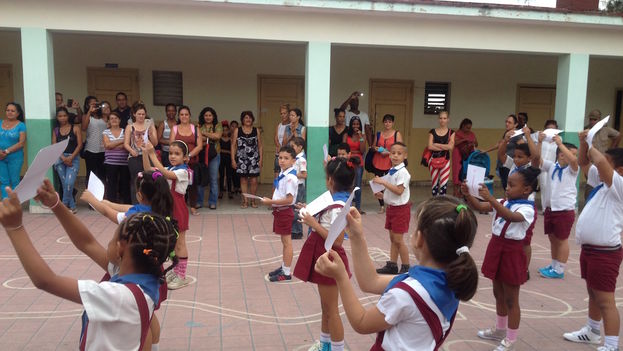
![]() 14ymedio, Generation Y, Yoani Sanchez, Havana, 29 June 2017 — “Today we are going to practice writing a letter,” announced the fourth grade teacher at a school in the Plaza of the Revolution district in mid-June. Immediately, Lucia, age 9, thought about writing a letter to her grandmother telling her about her latest acrobatics on skates, but the recipient had already been decided. “You are going to write a letter addressed to Fidel Castro thanking him for a free education,” declared the educator.
14ymedio, Generation Y, Yoani Sanchez, Havana, 29 June 2017 — “Today we are going to practice writing a letter,” announced the fourth grade teacher at a school in the Plaza of the Revolution district in mid-June. Immediately, Lucia, age 9, thought about writing a letter to her grandmother telling her about her latest acrobatics on skates, but the recipient had already been decided. “You are going to write a letter addressed to Fidel Castro thanking him for a free education,” declared the educator.
The girl froze. It never would have occurred to her to address a letter to a dead person, nor to anyone who wasn’t a friend or a member of her family. She scribbled the date on the top of the page and then stopped, with the pencil suspended in the air, not knowing what to do. “Lucia, you have to thank him for building schools and teaching Cuban children to read,” ordered the teacher.
The student remained paralyzed. “Come on, it is very likely that on the test they will ask you to write a letter to the Comandante and you have to practice.” The pencil didn’t move a fraction of an inch. “Look, I’m going to dictate some sentences to you and then you can continue on your own,” the teacher said, her tone increasingly irritable. “Fidel, without you I would have no shoes and no books and I would be illiterate,” she dictated. But the girl didn’t make a single mark.
When she got home the sheet of paper still had only the day and the month in one corner. So it was her mother’s turn to insist, “Think that you are writing another person and then later put ‘His’ name on it,” she proposed as a trick to get around the problem. Lucia imagined she was telling her grandmother about the games in the park, and thanking her for her affections and then signed it, squeezing in her name next to a drawing of a flower.
Last week the final exam included the request to write a letter. But this time it was addressed to the teacher and had to respond to the question, “What do you do to help your mom with the housework?” The girl stopped for several minutes with the pencil suspended over the paper without knowing what to do. No one came to dictate the sentences.
* This story is not literature, but absolute reality. The student’s name has been changed to avoid retaliation.
